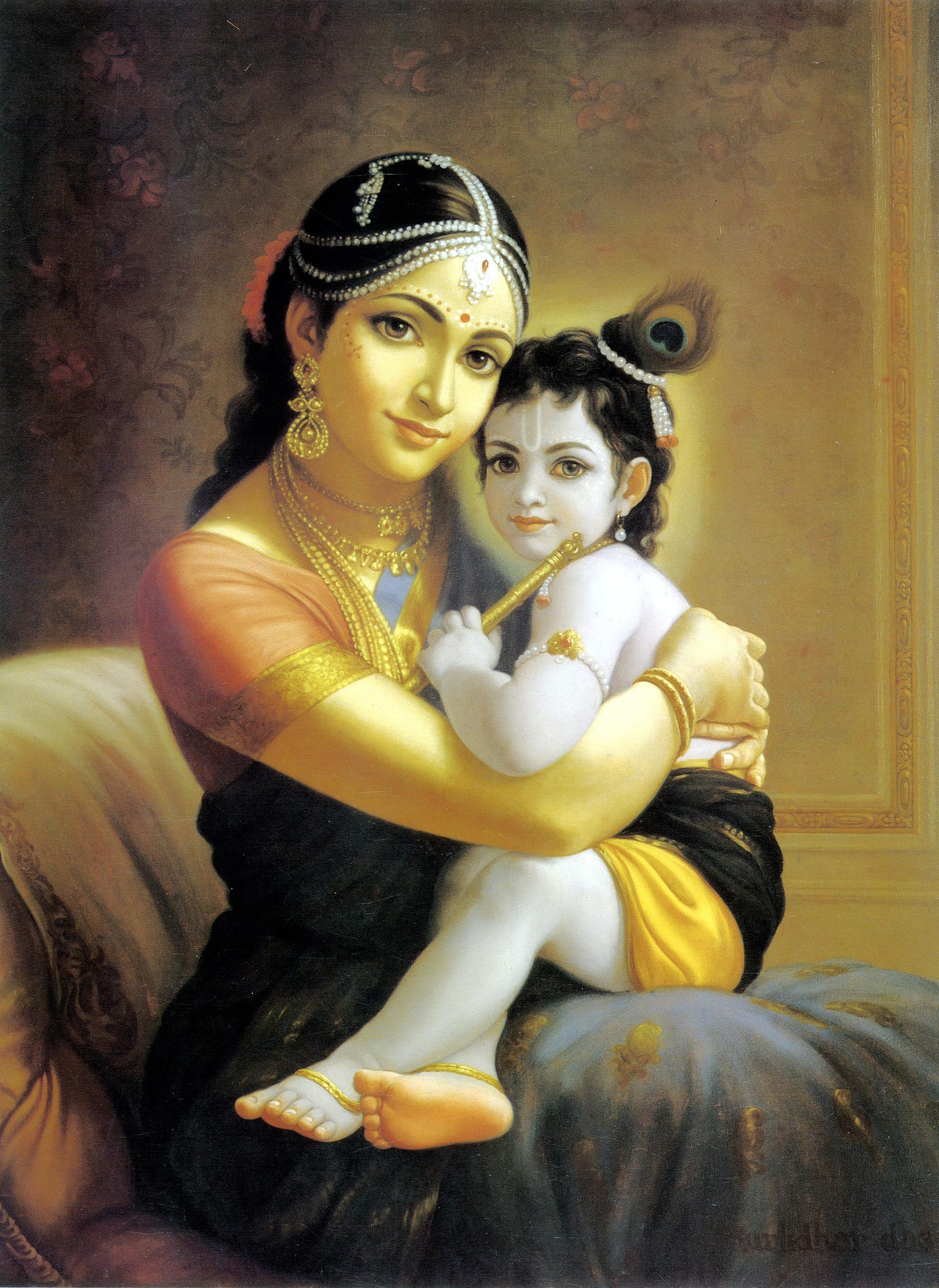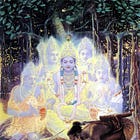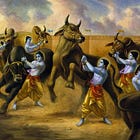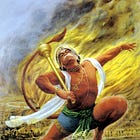Krsna attracts everyone
Krsna attracts everyone. One may be educated or not educated, have money or not, be pious or not, one can be conditioned by the three material modes or free, everyone is attracted by Krsna.
Srila Prabhupada explains that the Vedas are like a desire tree that contains all types of knowledge. Because most people are interested only in the four materialistic religious principles of dharma, artha, kama, and moksa (mundane religiosity, economic development, material sense gratification, and impersonal liberation), the Vedas explain a lot about how to achieve these in the karma-kanda sections. For people who are spiritually inclined, there are the jñana-kanda sections, which deal with spiritual knowledge, such as the Upanisads and the Vedanta-sutra, but the Srimad Bhagavatam brings the highest knowledge, directly describing the Supreme Personality of Godhead. The Srimad Bhagavatam is considered thus the essence or the ripened fruit of all Vedic literature.
This knowledge is so attractive that it can attract everyone, even people who are already liberated. In SB 1.7.10, there is a very famous verse that Sri Caitanya Mahāprabhu once explained in 64 different ways:
ātmārāmāś ca munayo
nirgranthā apy urukrame
kurvanty ahaitukīṁ bhaktim
ittham-bhūta-guno hariḥ“All different varieties of atmaramas, especially those established on the path of self-realization, though freed from all kinds of material bondage, desire to render unalloyed devotional service unto the Personality of Godhead. This means that the Lord possesses transcendental qualities and therefore can attract everyone, including liberated souls.”
The meaning is that Krsna attracts everyone. One may be educated or not educated, have money or not, follow the rules and regulations from the scriptures or not (in other words, be pious or be not pious), one can be conditioned by the three material modes, goodness, passion, and ignorance, or one may be free from these three modes, and so on, but Krsna can attract everyone. When He appeared in Vṛndāvana, He even attracted the birds, beasts, trees, and plants. In Vṛndāvana, everyone becomes attracted in love and affection for Kṛṣṇa.
In reality, liberation is not a very high goal. In the Bhagavad-Gita, Krsna explains:
brahma-bhūtaḥ prasannātmā, na śocati na kāṅkṣati
samaḥ sarveṣu bhūteṣu, mad-bhaktiṁ labhate parām"One who is thus transcendentally situated at once realizes the Supreme Brahman and becomes fully joyful. He never laments or desires to have anything. He is equally disposed toward every living entity. In that state he attains pure devotional service unto Me."
As this verse explains, even after one becomes free from all material contamination, there is still something higher, which is love for Krsna. This love for Krsna, or prema, is the eternal nature of the soul, and only when one attains this prema will he become fully satisfied. Amongst all the Vedas, the Srimad Bhagavatam is the book that directly speaks about this pure devotional service to Krsna, and therefore it can attract everyone, including all kinds of liberated souls. Surely it can attract us also.
Actually, all of us are already attracted to Krsna, but we are attracted in the wrong way. Everything that exists is connected with Krsna. As He explains in the Bhagavad-Gita (10.41-42): "Know that all opulent, beautiful, and glorious creations spring from but a spark of My splendor. But what need is there, Arjuna, for all this detailed knowledge? With a single fragment of Myself, I pervade and support this entire universe."
The problem is that now we are trying to enjoy these different things as separated from Krsna. This is the source of all our problems. How can we change it?
Devotees who are twice initiated chant the Gayatri mantra three times per day. The first verse of the Gayatri is a meditation on the light of the sun. Why do we meditate in the light of the sun? You may ask. Why not meditate on Krsna? The point is that the light of the sun is understood to be a reflection of the light of Krsna's effulgence. The sun is just like a mirror that reflects a tiny portion of the light of the Brahmajyoti, which in turn comes from Krsna. Behind this light is Krsna, who performs His personal pastimes in the spiritual world. In this way, the mantra teaches us that the light of the sun is not different from Krsna, so we can see Krsna every time we look at the sun.
In the same way, all beauty, power, strength, intelligence, knowledge, and renunciation, or in other words, all the qualities that we find attractive in different beings and objects, are just faint reflections of the opulence of Krsna. These different people and objects are just like mirrors, where the beauty, opulence, etc. of Krsna are reflected. However, due to the influence of illusion, we become attracted to the mirror instead of becoming attracted to the person being reflected. When we become attracted by the illusion, instead of the real Self, Krsna, we end up being abandoned by all these things, since this is the nature of the material illusion. Everything that is separated from Krsna becomes temporary in nature. We become attached to these things, and then we suffer when we lose them.
This point is explained in detail in the Brhad-aranyaka Upanisad:
"Everything does not become dear by the will of everything. Everything becomes dear by the will of the Lord."
"Everything rejects that person who thinks that everything is not fixed in the Lord."
"The brāhmaṇas, kṣatriyas, planets, demigods, living beings and everything else is included in the Lord."
The context of this passage is the dialogue of Yājñavalkya and his wife Maitreyī. Being ready to renounce family life, Yājñavalkya proposed to divide his riches between his two wives, but Maitreyī intelligently questioned if receiving such wealth would grant her eternal life. Yājñavalkya answered no: she would have financial support to live her life the way she wanted, but at the end, she would still have to face death like everyone else. The wealth would not bring her anything eternal. Surprisingly, Maitreyī then refused the inheritance and instead asked her husband to instruct her on whatever he knew about the process to achieve immortality.
Yājñavalkya then explained that all the people things we consider dear in this world, like the husband, wife, children, wealth, brāhmanas, kings, planets, demigods, and in fact as other living entities, and everything that exists are not dear to us by their own sake but because of their connection of the Lord. When we love these persons and objects for their own sake, without realizing their connection with the Lord, we are rejected by them, or in other words, we lose them in due curse of time. In this way, Yājñavalkya made a powerful statement that sent Maitreyī on the path of self-realization, expressing the illusory nature of this world and revealing the Lord as the underlying principle behind everything that exists and the ultimate destination.
The key word in the instructions is kāmāya (desire): na vā are patyuḥ kāmāya patiḥ priyo bhavati, ātmanas tu kāmāya patiḥ priyo bhavati. It is not for the sake of the husband that the husband is dear, but for the sake of ātma, the Lord, that he becomes dear. The same is repeated for the wife, children, etc.
How does this attraction work? Lord Sri Caitanya Mahāprabhu explains that: jīvera svarūpa haya — kṛṣṇera nitya-dāsa, "It is the living entity’s constitutional position to be an eternal servant of Kṛṣṇa". He also says: nitya-siddha kṛṣṇa-prema 'sādhya' kabhu naya, "Pure love for Kṛṣṇa is eternally established in the hearts of the living entities. It is not something to be gained from another source."
Love for Krsna is the eternal characteristic of the soul and thus can't be separated from it, as much as liquidity can be separated from water, but this love for Krsna can be covered, and when this happens, it manifests as lust, attraction to objects of sense enjoyment. At the same time, however, as Krsna explains in the Gītā, "Know that all opulent, beautiful and glorious creations spring from but a spark of My splendor."
Only when we become attracted to the final source of all these things, Krsna, can we find eternal happiness. The Bhagavatam is thus a book that teaches us to find happiness.
One of the names of Krsna is Hari. The meaning of Hari is that on one side, He takes away inauspicious things, and on the other side, He gives the most auspicious things. When a person develops love of Godhead, his mind becomes automatically attracted to the name, form, and qualities of the Lord. Normally, we have a lot of trouble controlling our minds, but this is only because at present our attention is focused on material things, and the mind becomes attracted to what we are seeing and experiencing. The special quality of the Srimad Bhagavatam is that by regularly hearing from it, our minds become gradually attracted to Krsna, and as our attention becomes focused on Krsna, we gradually become less interested in the things of this material world. This is the power of hearing about the transcendental activities of Krsna and Krsna's pure devotees in their innumerable pastimes.
Read also:
If you read this article to the end, give it a like. This makes Substack recommend it to more people.






Such a beautiful explanation thank you 🙏🏽🫶🏽🕯️